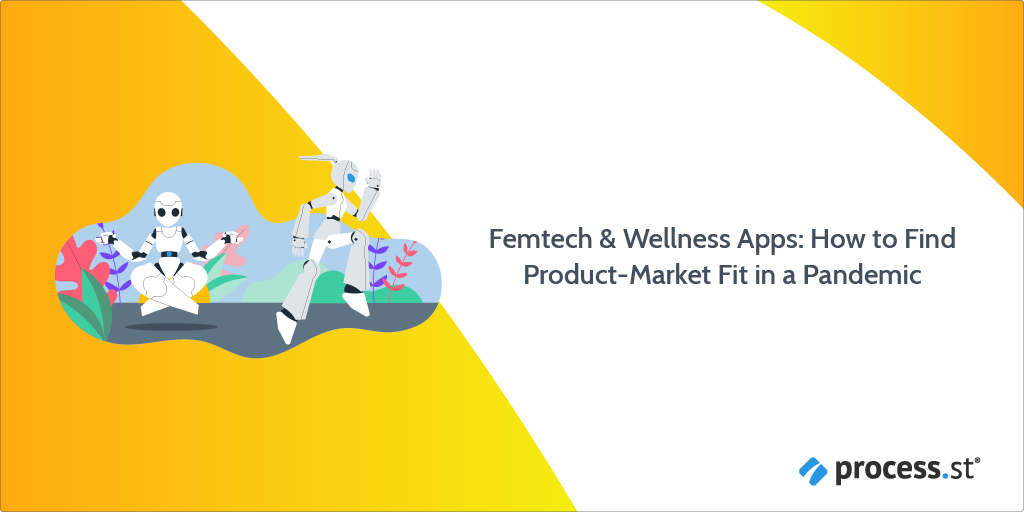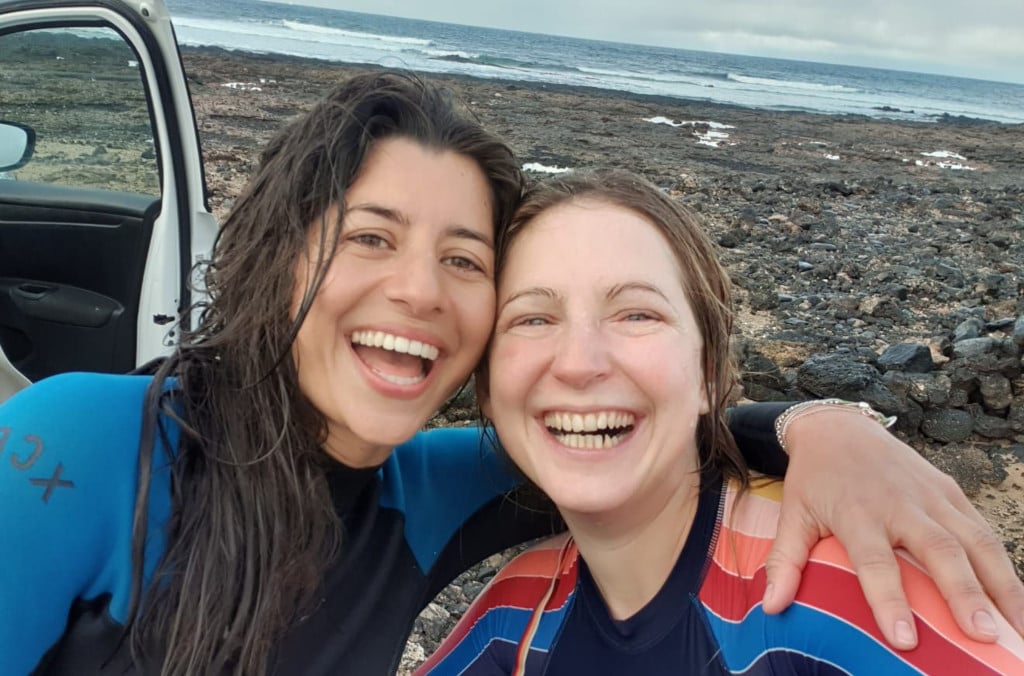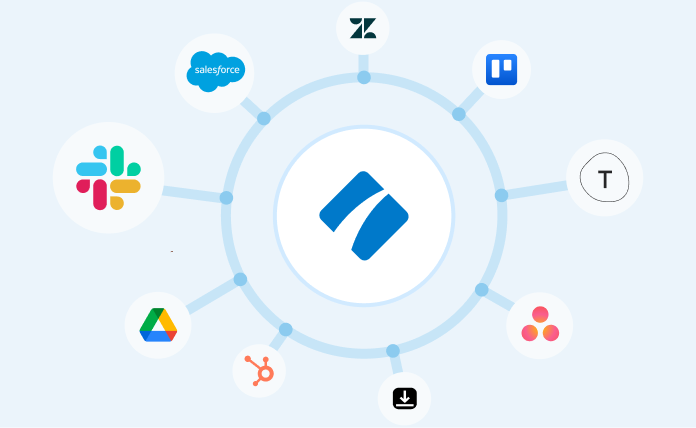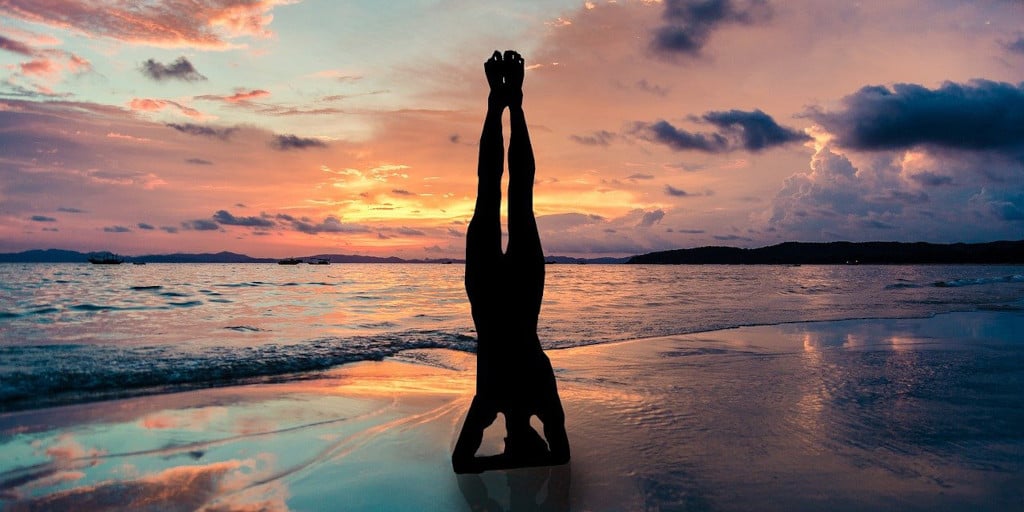
![]()
“In the midst of every crisis lies great opportunity.” – A. Einstein
I’ll refrain from attempting to mask something as devastating as the coronavirus with a silver lining. Nonetheless, there’s no denying that while the world goes bust there is one industry that continues to boom: Tech.
Since the first half of 2020, health and fitness app downloads have soared, growing by a whopping 46% worldwide.
What has been the pandemic’s influence on the femtech and wellness app industries? In this Process Street post, I feature an interview with Hélène Guillaume, founder of a femtech platform (Wild.AI), and Reeva Misra, the founder of a wellness app (Walking on Earth).
Wild.AI is a fitness platform that empowers female athletes by providing AI-powered personal trainers that adapt to the user’s needs. Walking on Earth is a wellness app and platform that offers every user access to personalized coaches and treatment plans.
- How it all comes together: The pandemic, wellness apps, & femtech
- Introducing the founders: Reeva Misra & Hélène Guillaume
- Developing a wellness app
- Developing a femtech platform
- Attracting investor attention as a wellness app
- Attracting investor attention as a femtech platform
- Finding product-market fit during a pandemic
How it all comes together: The pandemic, wellness apps, & Femtech
Since the onset of the pandemic, there has been a surge in downloads of mobile apps. App Annie found that in Q2 of 2020, consumers downloaded 35 billion new apps and mobile app usage grew 40% year-over-year.
Lockdown measures continue to influence the type of apps downloaded. The most popular apps offer some form of entertainment. These include social media apps like TikTok which was downloaded 89 million times in 2020 (in the US), and streaming apps like Disney+ and Netflix.
Wellness is another sector to have witnessed a significant increase in traffic. It is also one of the topics of this blog post.
According to a report from Sensor Tower, the world’s 10 largest wellness apps saw a combined 2 million more downloads in April 2020 (the height of the pandemic) compared to January of the same year. And the total amount of downloads for April reached close to 10 million.
What’s more, the digital mental health market is now projected to reach $4.6bn in 2026; a massive jump from its value of $1.4bn in 2017.
Evidently, the pandemic has encouraged many of us to start prioritizing our mental health and wellbeing. In fact, the health industry, in general, has taken center stage.
Femtech, another sector of the digital health industry, was already receiving growing attention prior to the pandemic. Otherwise known as female technology, Femtech refers to software, diagnostics, products, and services that use technology to improve women’s health.
In 2020, Pitchbook referred to the femtech space as being “poised for growth”, claiming that a rise in awareness of women’s health issues could help drive this new growth. They also predicted that the femtech industry would be worth at least $3 billion dollars by the end of 2030.
Introducing the founders: Reeva Misra & Hélène Guillaume

So, who is going to lead this growth?
I had the pleasure of meeting these inspirational women while living in Fuerteventura, the second-largest of the Canary Islands. On paper, Reeva and Hélène appear to be two power-women taking on the startup scene one personalized user experience at a time, but for me, they’re a couple of surfers/yogis who have mastered living life to the fullest.
To read their founder’s stories or to find out more about the companies they run, check out the following links:
- Founder story: Reeva Misra of Walking on Earth – #PANGAIAChangemakers
- Reeva Misra: It’s Time We Took Control of Our Health and Well-Being – Thrive Global
- Hélène Guillaume: Focus on FemTech: Hélène Guillaume on using AI to train smarter
- Hélène Guillaume: Into The Wild – Forbes
Developing a wellness app
![]()
“Talk me through developing your MVP and bringing your product to market.”
Reeva Misra (Walking on Earth):
“We started by creating a website where we brought together the leading practitioners across holistic health. These were people that myself or the Head of Wellbeing had worked with personally. These were all practitioners that you wouldn’t be able to just find easily; they’re the very best, and would only teach in places where you’d have to have extensive experience to find them. We then sent the website around to my network which consisted of a mailing list of a couple of 100 people, this whole process took a week to put together.
The launching of the website was interesting because it allowed us to see what people are searching for in terms of holistic health, preventative health, and wellbeing. By leveraging the initial user data, we uncovered valuable user insight. We found that people don’t know exactly what they want. They know they have certain issues like high stress, anxiety, back pain, or problems sleeping. But they won’t necessarily know what they should be doing to treat it. For example, they might not know the difference between say, an Iyengar yoga session, or a yoga Nidra practice. This informed our future strategy and helped us build out the app in a way that would help us achieve product-market fit.
Now, with the app, we onboard each new user by asking them a series of questions. For example, the first question is, “What brings you here?”. The options are things like back pain, anxieties, and so on. We then harness the user data collected during the onboarding process to create personalized wellbeing plans. These plans recommend specific teachers, practitioners, courses, and content based on people’s individual needs and challenges.
This level of personalization is our unique selling point.”
This smooth transition to finding product-market fit isn’t always so easy, especially when startups are just getting going. As was the case for my second interviewee, Hélène Guillaume of Wild.AI.
Developing a femtech platform
![]()
Talk me through developing your MVP. Did you encounter any challenges?
Hélène Guillaume (Wild.AI):
“The very first MVP we developed was a web app. We tried so many times and failed so many times. It wasn’t as simple as thinking to ourselves, okay we’re going to do this, then doing it, and then a month later having a flawless MVP. It took us a few months to create the first version, then we had to kill it. Then we created another version, and had to kill it again. It took three years to develop something that was good.
The main challenge was getting a real understanding of the problem we were trying to solve and dealing with how we could hone around getting product-market fit. Achieving product-market fit is what took so much time actually.
To get the product right there was a lot of complex research that needed to go into it. But the issue is, as a consumer you don’t want to see that. You want something simple to use, fun, and easy. The biggest challenge was finding a way to keep things simple for the user while maintaining the level of complexity needed behind the scenes for the product to suggest scientifically-backed solutions.”
The data repositories that both Wild.AI and Walking on Earth have accumulated will prove informative as femtech and wellness apps continue to gain traction. Data gathered from platforms like Wild.AI concerning women’s habits, requirements and needs will continue to be highly valuable to founders in all industries. Femtech data is particularly important to health apps since previously only men’s physiology and needs were used as the basis for all users.
Attracting investor attention as a wellness app
![]()
How did you attract investor attention?
Reeva Misra (Walking on Earth):
Point #1: The pandemic has made us all confront and deal with high levels of stress.
“We’re essentially living through a stress epidemic, particularly within the startup scene. This means it can sometimes be hard to persuade people and investors that stress is really harmful, both mentally and physically. A typical investor is likely to walk out because they, along with a lot of other people, still think stress is good for you. It’s like we’re tackling the notion that stress is important for success and you need to have stress to be successful.
With our platform, we’re using data and research to debunk this notion. I also think that over the last year, the perception has shifted because of COVID. COVID has shown us that if you’re not in good health then the whole world can come to a standstill. I think people haven’t been able to ignore that fact anymore because all workplaces have been thrown up in the air because of what is essentially a health epidemic.
Also, mental health within the workplace has also been drawn into the spotlight. As an outcome to COVID, roughly 70% of employees say it’s the most stressful time in their career. So a lot of the evidence is now appearing that shows that stress is having really negative effects in the workplace. So I think in terms of investors that has really helped us to attract attention.”
Reeva’s estimation is correct, mental health in the workplace has been brought into the limelight as a result of COVID. According to the 2021 Large Employers’ Health Care Strategy and Plan Design Survey, the number of large employers that provide access to online mental health support is expected to jump from 69% to 88% in 2021. This need is expected to be even more apparent in years to come with the largest share of the workforce now being Generation Z and Millennials who place higher importance on holistic employer programs than their older colleagues.
Point #2: A unique repository of wellbeing data helps.
“I also think the technological and scientific-minded investors are attracted to the unique data repository of wellbeing data that we are building. The data brings together input from top practitioners in holistic health and input from scientists. We then use this data to help refine the predictions that we make for our users. This is often considered really valuable in terms of long-term kind of investment value and output.”
Investors taking an interest in a “repository of wellbeing data” isn’t surprising; particularly if you take a look at how meditation apps like Calm and Headspace have fared in recent months.
According to estimates from Sensor Tower, in the first 11 months of 2020, Calm brought in $99.4 million in revenue with a little over 28 million installs. While, Headspace, the second-biggest meditation app by revenue, generated an estimated $64.5 million on nearly 11 million installs. Evidently, there is money to be made in mindfulness and meditation.
Much like the wellness apps, femtech has been receiving a favorable reaction from investors and the market in recent years. Next up Hélène provides some insight on this.
Attracting investor attention as femtech platform
![]()
“Did you have to wait for the market to mature enough for investors to show interest in Femtech?
Hélène Guillaume (Wild.AI):
“Our story has gradually become stronger and stronger and we also have a solid group of metrics now, both of which make the product more appealing to investors.
In recent years, we have also had a really good reaction from the market, something that we didn’t have before. When we first started out, it very much felt as though we were living in the shadows.
There are three things that I think have helped us succeed now. Firstly, the world is now ready for femtech, secondly, we are ready for the market, and finally, we now have a complex database of research that continues to grow.
Somehow the whole world has started to realize that women are also interesting.”
Wrapping up: Finding product-market fit during a pandemic
The pandemic has thrown issues like mental health, preventative health, and the importance of good health into the spotlight. All business norms have been completely upended and thrown into the air.
But, as has been demonstrated by the case of Wild.AI and Walking on Earth, from crisis comes an opportunity. An opportunity for innovation, empowerment, and transformation.
P.S. Make sure to check out our podcast “Tech Out Loud” featuring content written by respected industry leaders such as Hiten Shah, Sujan Patel, Noah Kagan, and more!
Did you find this article useful? Do you have any questions left unanswered? If so, let us know in the comments below! Who knows, maybe we’ll answer them in another follow-up post!







 Workflows
Workflows Forms
Forms Data Sets
Data Sets Pages
Pages Process AI
Process AI Automations
Automations Analytics
Analytics Apps
Apps Integrations
Integrations
 Property management
Property management
 Human resources
Human resources
 Customer management
Customer management
 Information technology
Information technology





Molly Stovold
Hey, I'm Molly, Junior Content Writer at Process Street with a First-Class Honors Degree in Development Studies & Spanish. I love writing so much that I also have my own blog where I write about everything that interests me; from traveling solo to mindful living. Check it out at mollystovold.com.